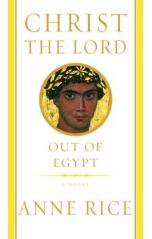Review: CHRIST THE LORD - OUT OF EGYPT
[reposted on my new blog - http://gottabuzz.typepad.com/coffee]
The latest cultural and literary news is that Anne Rice has found Jesus, that she's become a Christian, and that she now wants her writing to reflect her newfound faith and how it's impacted her life. I don't think it's a marketing scheme - she doesn't need the help, quite frankly, and it's not really the demographic her Lestat novels have traditionally been drawing. What has happened, instead, is that a storyteller has found a new story to share, and a new story in which to participate.
 Her first novel of a new series is Christ the Lord - Out of Egypt (copyright 2005, Alfred A. Knopf, Random House Inc.), and as a reviewer, I was pleasantly surprised. In the past, I've tried to read the opening chapters of a few of her other novels, but found it a chore to try to become involved emotionally with characters I ultimately had no love for. This was different, because this book tells a story with which we're already very intimately involved.
Her first novel of a new series is Christ the Lord - Out of Egypt (copyright 2005, Alfred A. Knopf, Random House Inc.), and as a reviewer, I was pleasantly surprised. In the past, I've tried to read the opening chapters of a few of her other novels, but found it a chore to try to become involved emotionally with characters I ultimately had no love for. This was different, because this book tells a story with which we're already very intimately involved.The basic premise is this: Jesus and His family have been in Egypt for seven years, sent there to escape Herod's bloody pride (Matthew 2:13-18). The story opens first person, the young Messiah telling His own story of His family's return to Galilee. The Christian reader will most probably have to get over the notion that there's nothing worthwhile to a story like this since it's not in and of itself "scriptural". Rather, because of her writing style and attention to storytelling and detail, the reader can catch a glimpse of something beyond the text - there was some untold story, some unwritten adventure, that Jesus lived out during His formative years.
As I was reading and being introduced to Jesus' extended family - all the cousins and aunts and uncles traveling with Mary and Joseph to Egypt and then back to the Promised Land - I got the distinct impression that Jesus was a Judean John Boy Walton, sharing the adventures and insights that come from having a big family, everyone having a voice and a role to play in the story. The years of relationship, the secrets of the adults kept from the innocence of the children, the interaction of the different generations, the realities of evil and good and everything that comes with sleeping and eating and living in tight quarters - those are the things that become vivid and real for the reader.
I was especially drawn into the first person narration of Jesus - where there's no gospel, nothing else written of Christ's life except His own quotes and parables as recalled by others, I felt like this liberty taken was justified. Did Jesus get sick? Did He have ultimate knowledge from the first, or did He have to learn some things like the rest of us? Did He feel revenge or fear or confusion? What kinds of questions did Jesus ask the teachers that prepared Him for His own questions and stories later on? There might be some issues to be taken doctrinally, but I think it misses the point to make this a theological exercise more than an artistic one. Rice has written her story, sharing her vision perhaps of what Jesus' story was like, even as she's now entered into it with her own talents and weaknesses, all of which probably pour out of this text in an entertaining and enlightening way.



3 Comments:
I am soooo glad you reviewed this. I had been reading articles about Rice and her book...but you're the first person I know who has read it. Thank you!!!!
no, thank you :) - yeah, i've enjoyed it, and look forward to the next in the series. you'll have to get it, let me know what you thought. thanks!
So does this look like it's a legitimate turn towards faith?
Post a Comment
<< Home